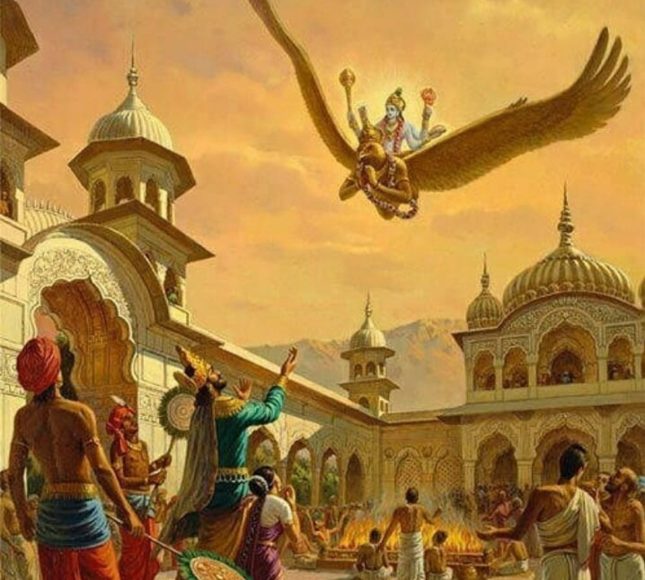ABARIKA (AMBARISHA) was granted the state of Fearlessness… (Bani Namdev, p. 1105) Ambarika (Ambarisha) etc….. (Swayye Mahle Chauthe Ke, p. 1405) Ambarisha was a king of Ayodhya. He was twenty-eighth in descent from Ikshwaku. He was the son of king Mandhata. It is said about him that he was very regular in observing the Ikadashi fast. Once when he was busy in such observance, the sage Durvasa came. He had to be served with meal.
Seeing the king thus engaged, the sage went to the stream to take a bath. The king waited for the sage, but he did not turn up. The king, therefore, broke his fast. When the sage reached, he came to know that before his arrival the king had broken the fast. He was in great rage and cursed the devout king.
It is said that the rage of the sage created a demoness, who ran to kill the king. The king then prayed to the Lord to save him from the wrath of the sage. The Lord sent his disens to protect the king. On seeing the Lord\’s discus, the sage ran for his safety in all the three worlds but no god could protect him. Ultimately, he went to the Lord, who advised him to go to the saintly king which he did and was thus saved.
References :
1. Kohli, Surindar Singh, Dictionary of Mythological References in Guru Granth Sahib, 1993
Ambarisha
The Guru Granth Sahib, the eternal scripture of Sikhism, transcends religious boundaries through its universal messages of devotion, humility, and service. This sacred text draws upon a myriad of mythological and historical references to illuminate moral lessons and foster spiritual understanding. Among such narratives is the mention of King Ambarisha, a revered figure from Hindu mythology, whose story resonates deeply with the Sikh ethos.
Ambarisha, a devotee of Lord Vishnu, is celebrated in Hindu traditions for his unwavering faith and righteousness. He is remembered for prioritizing devotion above worldly pleasures, epitomizing the essence of spiritual surrender. In the Guru Granth Sahib, Ambarisha’s tale serves as a metaphorical reminder of the supremacy of divine love and humility over ego and materialism.
The Guru Granth Sahib references King Ambarisha to underscore the values of surrender and dedication. His narrative is woven into the hymns to inspire individuals to transcend their egos and align their lives with divine will. For instance, in one hymn, Guru Arjan Dev Ji alludes to Ambarisha’s steadfastness, drawing attention to the triumph of devotion over challenges. This reference not only highlights the virtues of perseverance and humility but also showcases how mythological figures serve as exemplary models for spiritual seekers.
Through the mention of Ambarisha, the Guru Granth Sahib emphasizes the core principle of Sikhism: surrender to the divine and live a life of selflessness and devotion. The scripture’s use of such mythological figures bridges cultural and temporal divides, making its teachings universally relatable.
In conclusion, the story of Ambarisha, as referenced in the Guru Granth Sahib, is a timeless testimony to the transformative power of devotion and humility. It inspires followers to rise above material attachments and embrace a path of spiritual enlightenment, thus aligning their lives with divine harmony.





